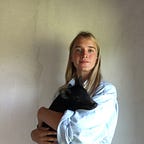On death and farming
Almost everyone who has worked in or adjacent to farming has heard the expression “If you have livestock, you have deadstock”. It’s usually said as a sort of fatalistic wry joke, expressed when confronted with an unfortunate and unexpected animal death. I take it more seriously though as recognition that the amount of life in this world is balanced exactly with the amount of death, and that seasons typically associated with life, such as lambing, always bring the shadow of death at their heels. I once spent some time at a farm that had a flock of sheep that existed mostly due to habit. They brought in no money, they had poor breeding, they suffered in winter and died at lambing, but tupping happened every year by default, and it was terrible to see the death and illness and pain that came with it when there was no reason at all for it to happen, when those animals never had to be born in the first place.
When you buy an animal or bring it into the world you are signing a contract for its death. While lambing is a beautiful time, even when everything goes smoothly, I now somewhat dread it for the terrifying vulnerability of a slick, sputtering lamb that slips out into our world. For the myriad ways she or her mother can suffer and die. Because when you find their limp or ailing form, or send them off in a trailer to slaughter, you have to ask yourself, was it worth it?
It is obvious to most but only occurred to me when I started farming that bringing animals into the world (or onto a farm, or into your home) is a heavy burden, not just because of the responsibility for their life, but because of your responsibility for their death; whether they go to another farm where you have little say in how they live and die, or they die in the various unpleasant but natural ways that are available to an animal, or they are killed in a manner of your choosing. I’ll admit that I’m often only ever a hair’s breadth away from being vegan because of this one-sided contract that the animals I care for have never signed on to. But I believe in the ecological imperative of livestock in a sustainable food future; I recall some of the many cultures in the world who show us a different model of relating to other species, and to death. I know that there is no good natural death for an animal in the wild, that a bullet in the head is kinder than starvation, disease, or predation. So I bring some creatures into the world and I worry and fret and try to provide the best life I can, and when I decide the time is right I try to release them from this life in as quick and painless and hopefully unaware way that I can manage. Because I owe that to them.
